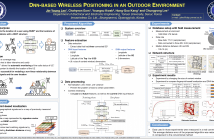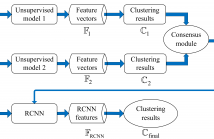
ICASSP is the world’s largest and most comprehensive technical conference focused on signal processing and its applications. The 2019 conference will feature world-class presentations by internationally renowned speakers, cutting-edge session topics and provide a fantastic opportunity to network with like-minded professionals from around the world. Visit website.

- Categories:
 29 Views
29 Views
- Read more about GMM-BASED ITERATIVE ENTROPY CODING FOR SPECTRAL ENVELOPES OF SPEECH AND AUDIO
- 2 comments
- Log in to post comments
Spectral envelope modelling is a central part of speech and
audio codecs and is traditionally based on either vector quantization
or scalar quantization followed by entropy coding. To
bridge the coding performance of vector quantization with the
low complexity of the scalar case, we propose an iterative approach
for entropy coding the spectral envelope parameters.
For each parameter, a univariate probability distribution is derived
from a Gaussian mixture model of the joint distribution
Poster_GMM.pdf
- Categories:
 46 Views
46 Views
In this paper, we propose a deep learning based algorithm to estimate the position of an user by utilizing reference signal received power (RSRP) and the location of base stations. To obtain reliable results in a real communication environment, parameters were measured using commercially available base stations and mobile phones within a LTE network. Since the structure of the measured data changes in accordance with the number of connected base stations, it is necessary to work on data uniformity processing before running the deep learning network.
ICASSP_LJY.pdf
- Categories:
 88 Views
88 Views
- Read more about Being low-rank in the time-frequency plane
- Log in to post comments
When using optimization methods with matrix variables in signal processing and machine learning, it is customary to assume some low-rank prior on the targeted solution. Nonnegative matrix factorization of spectrograms is a case in point in audio signal processing. However, this low-rank prior is not straightforwardly related to complex matrices obtained from a short-time Fourier -- or discrete Gabor -- transform (STFT), which is generally defined from and studied based on a modulation operator and a translation operator applied to a so-called window.
- Categories:
 22 Views
22 Views
The problem of load estimation from sensor signals holds significance in the field of intelligent manufacturing. The goal of this work is to estimate the axial and spindle load values in a Computer Numerical Control machine from input sensor readings like spindle speed, feed rate, tool positions, etc. This can be viewed as a standard regression problem. Here, we propose a novel deep learning based regression technique that incorporates regression within the stacked autoencoder framework.
- Categories:
 16 Views
16 Views
- Categories:
 4 Views
4 Views
- Read more about PSEUDO-SUPERVISED APPROACH FOR TEXT CLUSTERING BASED ON CONSENSUS ANALYSIS
- Log in to post comments
In recent years, neural networks (NN) have achieved remarkable performance improvement in text classification due to
their powerful ability to encode discriminative features by incorporating label information into model training. Inspired
by the success of NN in text classification, we propose a pseudo-supervised neural network approach for text clustering.
The neural network is trained in a supervised fashion with pseudo-labels, which are provided by the cluster labels
- Categories:
 6 Views
6 Views
- Read more about Sparse Support Recovery via Covariance Estimation
- Log in to post comments
We consider the problem of recovering the common support of a set of
$k$-sparse signals $\{\mathbf{x}_{i}\}_{i=1}^{L}$ from noisy linear
underdetermined measurements of the form
$\{{\Phi} \mathbf{x}_{i}+\mathbf{w}_{i}\}_{i=1}^{L}$ where
${\Phi}\in\rr^{m\times N}$ $(m<N)$ is the sensing matrix and
$\mathbf{w}_{i}$ is the additive noise. We employ a Bayesian setup where we impose a Gaussian prior with zero mean and a
common diagonal covariance matrix $\mathbf{\Gamma}$ across all
icassp_v3.pdf
- Categories:
 24 Views
24 Views
- Read more about SEMI-SUPERVISED TRAINING OF ACOUSTIC MODELS USING LATTICE-FREE MMI
- Log in to post comments
The lattice-free MMI objective (LF-MMI) has been used in supervised training of
state-of-the-art neural network acoustic models for automatic speech
recognition (ASR). With large amounts of unsupervised data available,
extending this approach to the semi-supervised scenario is of significance.
Finite-state transducer (FST) based supervision used with LF-MMI provides a
natural way to incorporate uncertainties when dealing with unsupervised data.
In this paper,
we describe various extensions to standard LF-MMI training to allow the use
- Categories:
 59 Views
59 Views